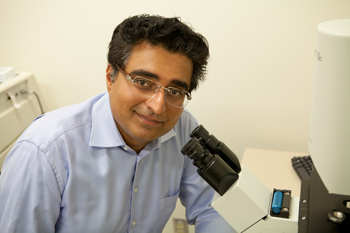St. Michael’s research contributes to multinational trial published in New England Journal of Medicine

By Ana Gajic

Dr. Subodh Verma
For patients who have heart failure or a reduced amount of blood pumped with each heartbeat, a medication used to treat diabetes also led to lower risks of worsening heart failure and death from heart-related ailments, suggests a recent study published in the New England Journal of Medicine.
The medication, called dapagliflozin, is generally used to treat patients who have type 2 diabetes and thus a higher risk of heart failure. This treatment falls under a category of drugs called SGLT2 inhibitors, which lower blood sugar. The New England Journal of Medicine article reports the results of a multinational trial: Dapagliflozin in patients with reduced ejection fraction heart failure (DAPA-HF), for which Dr. Subodh Verma, scientist at the Keenan Research Centre for Biomedical Science, was the Canadian national lead investigator at St. Michael’s Hospital.
“The DAPA-HF is the first trial to evaluate if an SGLT2 inhibitor, specifically, dapagliflozin, can treat heart failure with reduced amount of blood pumped with each heartbeat (known as ejection fraction),” said Dr. Verma. “With this trial, we examined whether the anti-diabetic agent may be effective even in people without diabetes.”
The team of researchers, led by Dr. John McMurray from the British Heart Foundation Cardiovascular Research Centre at the University of Glasgow, found that the medication reduced the risk of heart disease-related death and worsening heart failure by 26 per cent. It also reduced all-cause mortality by 17 per cent.
“Heart failure remains a significant medical problem with a very high rate of death,” Dr. Verma said. “New research in this area continues to help us help our patients with heart failure.”
The team is now interested in examining whether such therapies will be useful in people with heart failure and preserved ejection fraction, which is a condition where the heart muscle contracts normally but the ventricles do not relax as they should.
This study was funded by AstraZeneca, a pharmaceutical company that manufactures dapagliflozin. Dr. Subodh Verma has received honoraria and research support from AstraZeneca in the past.
About St. Michael’s Hospital
St. Michael’s Hospital provides compassionate care to all who enter its doors. The hospital also provides outstanding medical education to future health care professionals in more than 27 academic disciplines. Critical care and trauma, heart disease, neurosurgery, diabetes, cancer care, care of the homeless and global health are among the Hospital’s recognized areas of expertise. Through the Keenan Research Centre and the Li Ka Shing International Healthcare Education Centre, which make up the Li Ka Shing Knowledge Institute, research and education at St. Michael’s Hospital are recognized and make an impact around the world. Founded in 1892, the hospital is fully affiliated with the University of Toronto.
About Unity Health Toronto
Unity Health Toronto, comprised of Providence Healthcare, St. Joseph’s Health Centre and St. Michael’s Hospital, works to advance the health of everyone in our urban communities and beyond. Our health network serves patients, residents and clients across the full spectrum of care, spanning primary care, secondary community care, tertiary and quaternary care services to post-acute through rehabilitation, palliative care and long-term care, while investing in world-class research and education. For more information, visit www.unityhealth.to.
